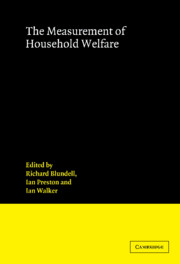Book contents
- Frontmatter
- Contents
- List of contributors
- 1 An introduction to applied welfare analysis
- 2 Measuring the cost of children: a theoretical framework
- 3 The collective approach to household behaviour
- 4 Ordinal and cardinal utility: an integration of the two dimensions of the welfare concept
- 5 The determination of welfare in nonintact families
- 6 Female labour supply, housework and family welfare
- 7 Engel equivalence scales in Sri Lanka: exactness, specification, measurement error
- 8 Measuring the life-cycle consumption costs of children
- 9 Family fortunes in the 1970s and 1980s
- 10 Ethically-consistent welfare prescriptions are reference price-independent
- 11 The effect of systematic misperception of income on the subjective poverty line
- Index of names
- Index of subjects
9 - Family fortunes in the 1970s and 1980s
Published online by Cambridge University Press: 13 January 2010
- Frontmatter
- Contents
- List of contributors
- 1 An introduction to applied welfare analysis
- 2 Measuring the cost of children: a theoretical framework
- 3 The collective approach to household behaviour
- 4 Ordinal and cardinal utility: an integration of the two dimensions of the welfare concept
- 5 The determination of welfare in nonintact families
- 6 Female labour supply, housework and family welfare
- 7 Engel equivalence scales in Sri Lanka: exactness, specification, measurement error
- 8 Measuring the life-cycle consumption costs of children
- 9 Family fortunes in the 1970s and 1980s
- 10 Ethically-consistent welfare prescriptions are reference price-independent
- 11 The effect of systematic misperception of income on the subjective poverty line
- Index of names
- Index of subjects
Summary
Introduction
There is continuing debate about how the income distribution has changed over the last decade or so. The arguments in the UK are not so much about whether overall inequality and average real income have increased, since most people agree that they have. The controversy is about whether everyone has benefited from increases in overall living standards, and the size of the changes. How have families with children fared relative to those without children? Are the income changes large or small? In this chapter we provide new answers to such questions, analysing changes in family fortunes in the UK between 1971 and 1986.
Our results also illustrate a more general methodological point: that it is important to have high quality, consistently defined, data for studying income trends. What may at first sight appear to be minor and obvious points about empirical definitions can have a significant impact on the conclusions of interest. Our research shows why official UK income statistics can be unreliable sources about trends in family fortunes. Since most commentators do nevertheless rely on official sources, it is important to document the deficiencies of these series.
Our point about the importance of data quality has been made before of course, but recent empirical work with UK household micro data has focused on the incomes of poor people only. In this chapter we address several new issues.
First we analyse the changing fortunes of middle and high income people as well as low income people.
- Type
- Chapter
- Information
- The Measurement of Household Welfare , pp. 215 - 246Publisher: Cambridge University PressPrint publication year: 1994



